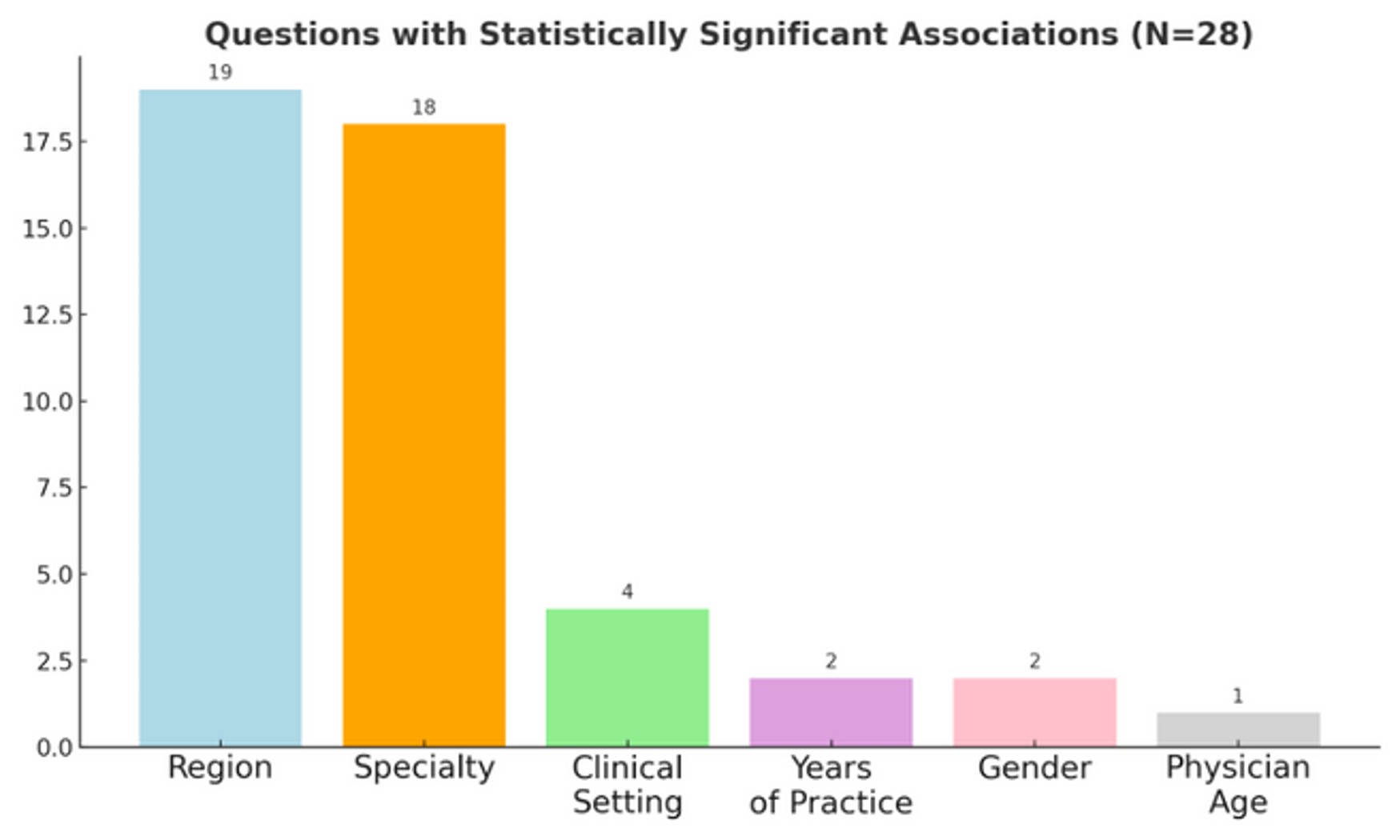Session Information
Date: Tuesday, October 28, 2025
Title: (2524–2546) Vasculitis – Non-ANCA-Associated & Related Disorders Poster III
Session Type: Poster Session C
Session Time: 10:30AM-12:30PM
Background/Purpose: IgA Vasculitis (IgAV) is the most common small-vessel vasculitis in children. Although there is no evidence-based recommendations for treating IgAV, the European SHARE recommendations published in 2019 provided international expert consensus for its treatment1. This study aims to explore the treatment and disease follow-up approaches in IgA Vasculitis among pediatricians and pediatric rheumatologists throughout the world, based on the disease presentation, including organ involvement and severity.
Methods: A 24-question electronic, cross sectional international survey was sent to pediatricians and pediatric rheumatologists through electronic platforms. Responses were anonymous and voluntary. Responses were analyzed for variability by geographic location, gender, experience, subspecialty and practice setting (hospital vs. clinic). 196 pediatricians were included in the analysis, of which 123 were pediatric rheumatologists.
Results: Geographic variability, gender, subspecialty, practice setting and clinical experience were all found to significantly affect the choice of treatment for HSP (Figure 1). Geographic location showed the greatest variability (Figure 2), followed by subspecialty (Figure 3). For example, in cases of severe gastrointestinal (GI) symptoms, the administration of high-dose Methylprednisolone IV at 30 mg/kg/day for three days, followed by tapering was more common in North America compared to Asia and Europe (p=0.043). For mild GI symptoms, pediatric rheumatologists were less likely to choose NSAIDs compared to general pediatricians (p=0.024) and preferred hydration and rest (p=0.024). Practice setting influenced treatment choices, with hospital-based physicians favoring IV steroids for severe GI and renal involvement more than clinic-based physicians (p=0.032). Gender was shown to have a limited impact, with minor differences noted in specific GI treatments. Clinical experience primarily affected steroid tapering duration, with more experienced physicians favoring shorter tapering periods (p=0.03).
Conclusion: To the best of our knowledge, this is the first international study to assess real-world treatment approaches to IgA vasculitis in children. The study reveals significant variability in the treatment preferences for IgAV, affected primarily by geographic location and subspecialty, with lesser contribution of clinical setting, years of practice and gender. These findings highlight the need to develop standardized, evidence-based clinical guidelines to the treatment approach for IgAV, in order to reduce variability and improve the care of children with IgA-Vasculitis. References: 1Ozen S, Marks SD, Brogan P, Groot N, de Graeff N, Avcin T, Bader-Meunier B, Dolezalova P, Feldman BM, Kone-Paut I, Lahdenne P. European consensus-based recommendations for diagnosis and treatment of immunoglobulin A vasculitis—the SHARE initiative. Rheumatology. 2019 Sep 1;58(9):1607-16.
 The Statistically significant associations identified for each physician characteristic (out of 28 analyses). Geographic region (19/28) and medical specialization (18/28) showed the strongest effect on the treatment choices, while gender, experience, practice setting, and age had minimal impact.
The Statistically significant associations identified for each physician characteristic (out of 28 analyses). Geographic region (19/28) and medical specialization (18/28) showed the strongest effect on the treatment choices, while gender, experience, practice setting, and age had minimal impact.
.jpg) Selected treatment questions demonstrating significant differences between geographic regions of the replying physicians. In cases of renal involvement, European physicians showed higher preference for ACE inhibitors/ARBs, while North American physicians preferred MMF and longer steroid tapering.
Selected treatment questions demonstrating significant differences between geographic regions of the replying physicians. In cases of renal involvement, European physicians showed higher preference for ACE inhibitors/ARBs, while North American physicians preferred MMF and longer steroid tapering.
.jpg) Selected treatment questions demonstrating significant differences between rheumatologists and general pediatricians. Rheumatologists reported higher use of ACE inhibitors/ARBs and MMF, along with a tendency toward longer steroid tapering.
Selected treatment questions demonstrating significant differences between rheumatologists and general pediatricians. Rheumatologists reported higher use of ACE inhibitors/ARBs and MMF, along with a tendency toward longer steroid tapering.
To cite this abstract in AMA style:
Heshin Bekenstein M, Elbaz T, Illous Y, Kandell B. Variation in Treatment Approaches in IgA-Vasculitis Among Pediatricians and Pediatric rheumatologists: A Cross-Sectional International Survey [abstract]. Arthritis Rheumatol. 2025; 77 (suppl 9). https://acrabstracts.org/abstract/variation-in-treatment-approaches-in-iga-vasculitis-among-pediatricians-and-pediatric-rheumatologists-a-cross-sectional-international-survey/. Accessed .« Back to ACR Convergence 2025
ACR Meeting Abstracts - https://acrabstracts.org/abstract/variation-in-treatment-approaches-in-iga-vasculitis-among-pediatricians-and-pediatric-rheumatologists-a-cross-sectional-international-survey/
